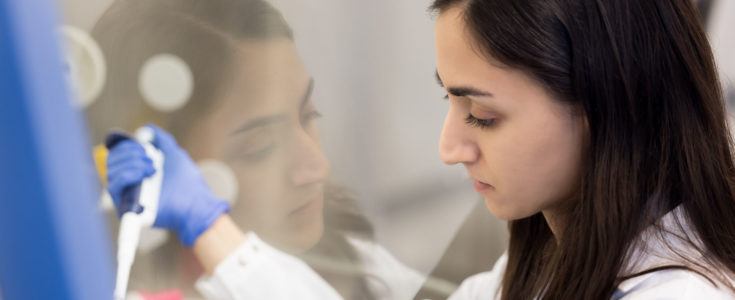
Ivy Blog
Staff Spotlight: Costanza Lo Cascio
- September 9, 2021
- Ivy Center
- Posted in #IvyTeam


Job Title: PhD Candidate
Hometown: Rome, Italy
What made you want to work for the Ivy Brain Tumor Center?
In 2016, I started pursuing my PhD as a graduate student in Dr. Shwetal Mehta’s lab at Barrow Neurological Institute. Two years later, the Ivy Brain Tumor Center was established, giving me the opportunity to become one of the first team members of its Preclinical Core.
During my undergraduate studies, I developed a strong interest in brain tumors because it combined three disciplines I am very passionate about: cancer, neuroscience and developmental biology. As a young student, I remember learning that while survival outcomes for patients with common cancers have improved dramatically due to enormous advances in science and medicine, the median survival for glioblastoma (GBM) patients has barely changed over the past several decades. As a budding scientist, I wanted to contribute to the ongoing translational research efforts that aim to eradicate this devastating disease.
I joined Dr. Mehta’s lab at Barrow because I specifically wanted to study the mechanisms that render glioblastoma cells so resistant to conventional treatments. Being a part of the Ivy Center team gives me an immense sense of purpose because I am faced with the clinical reality of this disease every day. Knowing that I am training at a center that is changing the way we approach GBM and giving patients hope is an incredible feeling. It has been great to witness the growth and evolution of the Ivy Center from a concept on paper to the largest Phase 0 clinical trials program in the world.
What does it mean to you to work for the Ivy Center?
Working at the Ivy Center means that I am part of an unprecedented effort to change the face of one of the deadliest cancers known to man. This knowledge provides immense satisfaction and meaning to everything I do. None of our research would be possible if it weren’t for the patients who generously donate their own tumor tissue for us to study in order to advance the field. Knowing that we provide new answers to patients on a daily basis fuels my motivation to go into the lab and spend long hours designing experiments to address important, meaningful questions with the intention of translating our findings into future therapies for glioblastoma.
What motivated you to get into the medical field, specifically research?
I initially became interested in medical research when my mother was diagnosed with an incurable autoimmune disorder. I wanted to understand why her own immune cells were attacking her body, and over time this led to a passion for cell biology and the study of diseases. Although I did contemplate going to medical school at one point, I later decided I wanted to use my innate curiosity and scientific drive to contribute to complex and important medical challenges from the lab bench.
What is your favorite part about your job?
My favorite part of what I do is being able to work in a multi-disciplinary environment where everyone’s expertise is elevated to ensure we come up with the best approaches and experimental designs needed to study and tackle this disease. As a graduate student it’s been incredible to witness first-hand how innovative Phase 0 clinical trials are conceived, designed and implemented. All of this is happening in the same center I work in, where I carry out multiple experiments with precious patient samples. While my role at the center is focused on translational research in the lab, I know I am part of a bigger movement that is trying to change the way GBM is being treated. It’s truly a unique and thrilling experience. I come to the lab with the motivation to learn something new and keep trying harder, regardless if the results I obtain are positive or negative.
What keeps you motivated when dealing with such a complex disease?
Patients and their families who are currently, already have, or will one day battle this disease. Every time I look at GBM cells under the microscope, I am reminded of where the specimens I am studying originated from. I want to contribute to a meaningful cause that gives these patients hope and a better quality of life. I always try to keep my mind set on the big picture, and believe that our collective efforts are making a difference for these patients.
Explain your role in the research being conducted at the Ivy Center.
My research is focused on understanding how GBM cells change and evolve in response to a particular treatment. By studying how and when treatment resistance develops in GBM, my work has the potential to provide insight into how such resistance may be overcome in the clinic. Hence, the work I conduct within the preclinical team at the Ivy Center has the potential to pave the way for the development of new treatment strategies to treat these aggressive tumors.
